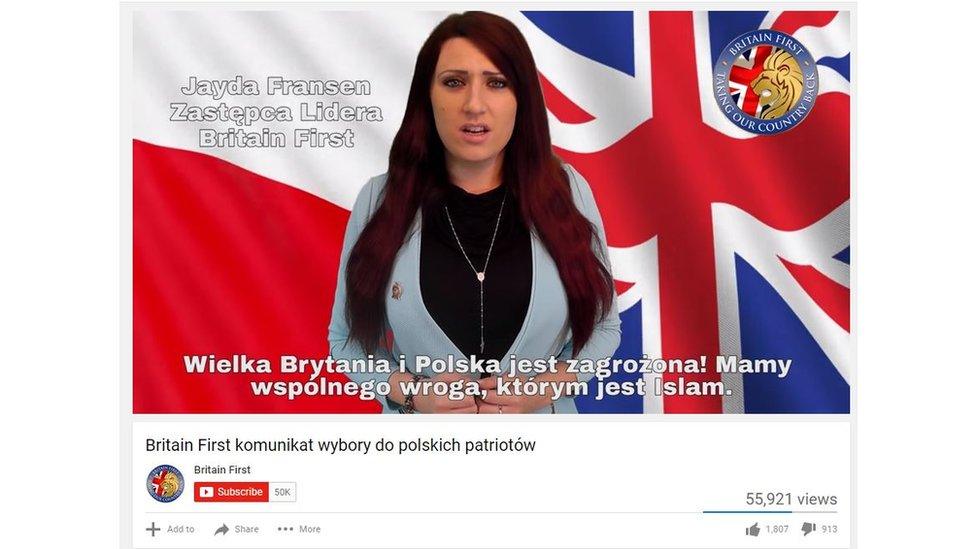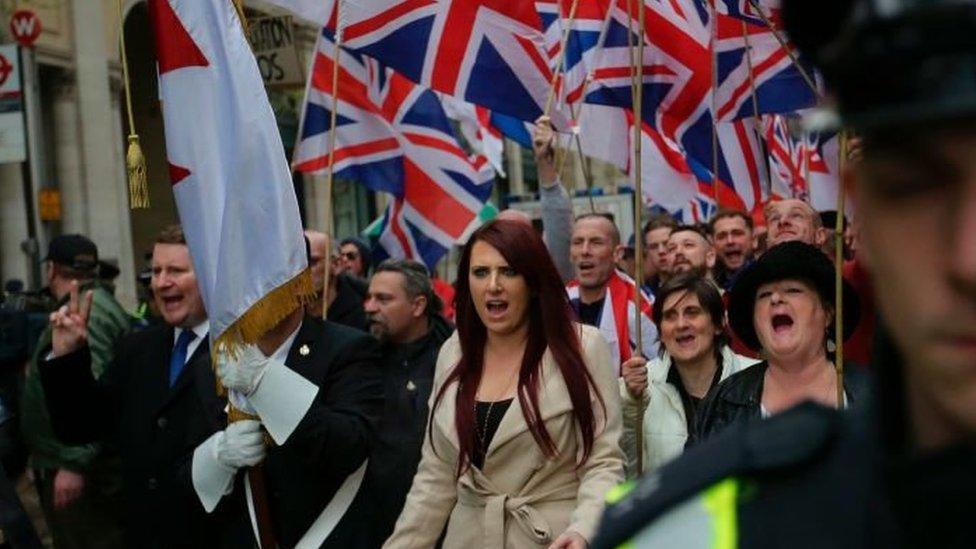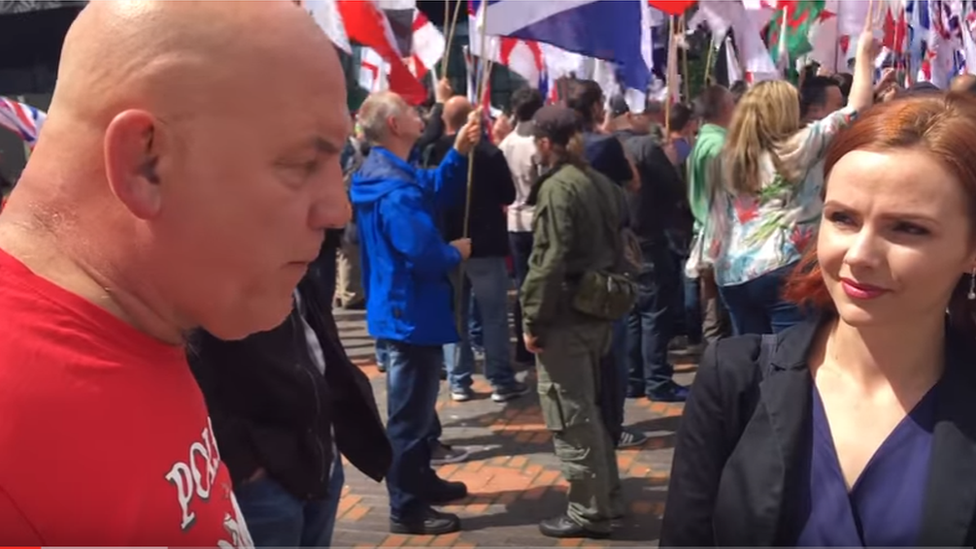The anti-immigration party trying to recruit immigrants
- Published

Although their manifesto calls for a near-total halt to immigration, the far-right political party Britain First is now actively trying to appeal to Polish immigrants.
They are a fringe group, with no elected officials at any level, but Britain First has about 1.9 million Facebook likes - more than any other UK political party. And now they're trying to use that social media footprint to make explicit appeals to Polish immigrants living in the UK.
A string of Britain First videos that seem designed to attract a Polish audience have appeared online. Recent ones include a video from Jacek Miedlar, a Polish far-right former priest, an interview with a Polish media outlet that has over half a million views, and videos by Polish Britain First supporters encouraging others to support the party.
Miedlar, who has over 25,000 subscribers on YouTube, is an activist known for his anti-Semitic and anti-Islamic views. He has tried to travel to the UK twice this year to attend Britain First rallies but was stopped by UK authorities.
The videos have been posted despite Britain First's anti-immigration manifesto which calls for cash payments to foreigners to leave the UK, a complete halt to immigration except for people who marry British citizens, and a call to make it "an act of treason to implement any policy or measure, or sign any agreement, that facilitates and/or results in significant numbers of foreigners entering the sovereign territory of the United Kingdom with the aim of settling."
LISTEN: on BBC Trending radio
Visit BBC Trending on Facebook, external
Despite the party's hard line on immigration, Britain First deputy leader Jayda Fransen told BBC Trending that post-Brexit, all European immigrants who are already in the UK should be allowed to stay, as long as they aren't criminals or Muslims. The party also supports a total ban on Islam in the UK, a policy they believe will attract some support from Polish migrants.
Poles form the largest immigrant community in Britain. There were an estimated 831,000 Polish-born residents in 2015 - a jump of almost 750,000 compared with the number in 2004, the year Poland joined the European Union.
Rafal Pankowski from the Polish anti-hate charity Never Again says the party's attempts to appeal to UK-based Polish people may have something to do with what he perceives to be a trend towards the far-right in Polish society.
"We have been witnessing a rise in far-right activity in Poland itself as well," he says. "And unfortunately the Polish people in the UK have been victims of discrimination and hate crime especially since the Brexit referendum. And some of them have been turning to Polish far-right nationalist groups for a sense of belonging."

A number of videos have appeared on the Britain First Youtube channel seemingly aimed at the UK's Polish population
'Not pleasant'
Wiktor Moszczynski, a former spokesperson for the Federation of Poles in Great Britain, agrees that there has been a spike of far-right activity amongst Polish people living in the UK, but says that such activity has recently died down.
"At the moment the trend tends to be towards the right in Polish society, both in Poland and to some extent here in the UK, but when I say right that doesn't necessarily mean radical right," Moszczynski tells BBC Trending radio.
"Suddenly these groups began turning up in demonstrations in the UK over the last two or three years generally wearing Polish fascist symbols, but what I do have to say is I have not seen anything of this in the last year," he says. "I have been spoken to by the police who are very concerned about these groups, so we do know that there may still be an undercurrent. But at the moment the problem seems to have been in remission, temporarily at least."
He says a majority of the younger Polish community are resistant to the influence of far-right groups, including Britain First, but nevertheless the far-right spike is "not pleasant, particularly at a time when we're trying to build up sympathy for the Poles living in this country on the way they've been treated after the Brexit vote."
'Far-right rise'
A recent report, external from the campaigning group Hope Not Hate said the largest and most organised neo-Nazi group in the UK is the National Rebirth of Poland. The presence of groups like these, Hope Not Hate says, has fuelled extreme far-right activists.
Britain First rarely runs candidates. When they do they receive a small amount of the vote, such as the 1.2% of the vote party leader Paul Golding attracted in the 2016 London mayoral election. Its outsized social media following is due to a combination of factors including paid advertising, external, a core group of dedicated followers, external, and the use of less controversial posts - for instance messages encouraging people to support the troops or the royal family - and other tactics to drive up the numbers of likes.
The group's Facebook page has also become something of an international hub people attracted to its anti-Islam message. According to an analysis by Trending, less than half (44%) of the group's Facebook likes come from accounts based inside the UK, with large numbers of likes coming from the US, Australia and Canada. Around 23,000 of the page's likes come from Polish accounts.
By way of comparison, 87% of the Labour Party's 1 million likes come from UK accounts. The figure for the Conservative Party (more than 600,000 likes) is 78%.
Fransen claims the party has a "growing number" of Polish members and supporters, but refused to provide membership figures. She says the party's low appeal at the ballot box can be explained by the fact that the group has been concentrating on direct action, including turning up at the homes and offices of elected officials.

Former Polish wrestling champion Marian Lukasik (left) called for the assassination of Angela Merkel over her country's refugee policy
Pankowski believes the membership figures are very small, yet says his organisation saw via social media a number of Polish flags and Polish people at a Britain First rally in Birmingham last month.
In one video from the event, a UK-based Polish former wrestling champion Marian Lukasik, can be heard advocating the assassination of German Chancellor Angela Merkel because of her country's refugee policy. Lukasik has recently made other videos in support of Britain First.
"Britain First decided to attract support among the Polish community in the UK against Muslims, and a small section of the Polish community in the UK is probably prone to such messages," Pankowski says. "But obviously it's ironic because Polish migrants and Muslim migrants in the UK actually have a lot in common in terms of the everyday challenges they face."
Blog by Kayleen Devlin
You can find BBC Trending on Facebook, external or follow us on Twitter @BBCtrending, external. All our stories are at bbc.com/trending.